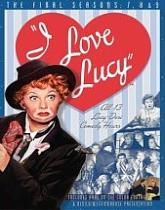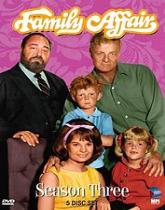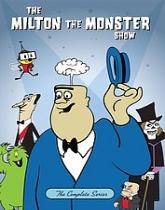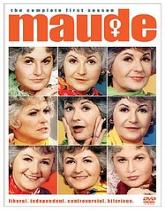
Knight at HOME at the Movies
Retro TV Round Up
Iconic TV shows all...okay, maybe not all, but this week we've got great TV on DVD choices from the 50s, 60s, and 70s. Warm up
those players!
Iconic TV shows all...okay, maybe not all, but this week we've got great TV on DVD choices from the 50s, 60s, and 70s. Warm up
those players!
There are classic television shows and then there’s “I Love Lucy.” The show that set the
bar that’s still holding nicely, thank you, over 55 years after making its debut. For years
Desi Arnaz had wanted to do hour long episodes of “I Love Lucy” and in 1957, for the
show’s seventh season, there was no request that either Arnaz or Lucille Ball could make
to CBS that they would turn down. The show was retitled “The Lucy-Desi Comedy Hour,”
sponsored by Ford, and each episode was introduced on a soundstage in front of a curtain
by Desi. Having done a wonderful job on all the previous seasons, Paramount Home
Video hasn’t skimped on the last three seasons of the series. The official title of the 4-
disc set is I Love Lucy – The Complete Seasons 7-9 and it contains the 13 one
hour episodes originally aired between 1957 and 1959 when Lucy and Desi called it quits
on both their marriage and the series.
The premise here is that Ricky Ricardo and his band have become successful enough for
he and Lucy and Little Ricky (and the Mertzes of course) to all pack up and move to fancy
schmancy Connecticut. Naturally, with Lucy still in scheming mode, new opportunities for
her brand of physical comedy are not far off. The guest star quotient is pushed (and
because of the longer, interesting length, they’re given more to do) with the Tallulah
“Darling” Bankhead episode the first – and the funniest. Originally written as a two half
hour shows and welded together, this is the episode in which Lucy cajoles Fred and Ethel
to pose as her “hired couple” and then later has the onstage hi-jinx with Tallulah during
the community production. Other celebrities, from Milton Berle to Betty Grable show up in
this grouping. The final episode with guest stars Edie Adams and Ernie Kovacs is funny
and wistful as by that point, as we all know, Lucy and Ricky weren’t even speaking to one
another.
Paramount has included the original, long version of the Havana episode – not seen since
first airing, along with rare scenes cut out of the other shows, and a great deal of other
special material. These are a welcome conclusion to their bang up job on the series and
a must for Lucy fans.
There’s more Buffy, Jody, Cissy, Mr. French, and Uncle Bill to love – a lot more in MPI
Home Video’s 5-disc Family Affair Season 3 set. This charming, heartwarming series
focused on three orphaned children – little Buffy with the pigtails and her ever present
Mrs. Beasley doll, her brother Jody with his freckles, and their groovy teenage sister Cissy
– who lived in the fabu-lush bachelor apartment with their Uncle Bill and his effete,
exceedingly polite man servant, Mr. French. Each week this unusual family grouping,
which usually focused on the antics of the two kids, featured comedic sitcom dilemmas
typical of the period (the mid to late 1960s) wherein the kids learned a valuable lesson
from one of the adults. By 1968 when season three (which had 28 episodes) aired the
show was delving into topics that were a bit tougher than normal family oriented sitcom
fare – latch key kids, a two parter (with Eve Plumb) as a little girl dying from leukemia,
etc. All this was handled beautifully by Brian Keith as the star of the show who, as The
Parent Trap had proved, had an exceptional gift for working with child actors. The set
includes a very welcome 30 minute reunion show which offers a lot of nice anecdotes from
surviving cast members and show creators.
I grew up in the 1960s and remember vividly the impact some of the cartoon Saturday
morning shows had on me. Some of these shows barely lasted but I still can recall their
theme songs and specific episodes. Milton the Monster which aired in 1965 was just
such a show. I can still sing the faux “creepy” theme song and recall the vampires,
werewolves, and other assorted monsters in the opening credit sequence who all resided
at the mansion of the resident Mad Doctor. Now Shout! Factory is releasing the complete
26 episodes of the one season show and the show, highly influenced by “The Munsters”
and “The Addams Family,” (no surprise there) contains all the creepy/fun characters I
remembered. Milton and company actually served as a framing device for a group of
other cartoons (the most memorable being Fearless Fly). The animation is on the level
of the Hanna-Barbera cartoons of the period and the voice work is very tongue-in-cheek
(though the humor and writing aren’t exactly as scintillating or comical as I recall). A fun
set (4-discs) with a batch of interesting extras. An interesting curio and nice for the
kiddies.
Before “The Golden Girls” there was “Maude” and between the two sitcoms, Bea Arthur with
her acidic delivery and crack timing, should be enshrined forever in the TV comedy hall of
fame. Disney recently brought out the final season of the GG’s but before you go into
Bea Arthur withdrawal, Sony Pictures Home Entertainment brings you Maude – The
Complete First Season. From the first notes of Maude’s theme song (sung by the
late, great Donny Hathaway), it was immediately apparent that here was a show that was
going to tackle social issues and present them with razor sharp comedy.
No surprise, as the show was a spin-off from “All in the Family” and the country had seen
Maude easily take on her cousin, Archie Bunker and flatten him verbally. In 1972 Maude
the feminist, who lived with her fourth husband Walter (“Got’ll get you for that Walter”),
divorced daughter Carol (sexy Adrienne Barbeau), and her grandson, indeed took America
by storm. The first season (22 episodes spread out on 3-discs) saw Maude tackle racism,
abortion, sexism, careerism, and just about every other “ism” that wasn’t being explored
on “All in the Family” by the creator of both shows, Norman Lear. Many of the topics that
the show fearlessly explored still seem fresh today – aided in no part by the sharp writing
and expert playing not just of Arthur in the title role but her supporting cast (they also
include in a memorable episode, the introduction of Esther Rolle as Florida, who would go
on to sitcom stardom of her own in “Good Times”). No extras.
bar that’s still holding nicely, thank you, over 55 years after making its debut. For years
Desi Arnaz had wanted to do hour long episodes of “I Love Lucy” and in 1957, for the
show’s seventh season, there was no request that either Arnaz or Lucille Ball could make
to CBS that they would turn down. The show was retitled “The Lucy-Desi Comedy Hour,”
sponsored by Ford, and each episode was introduced on a soundstage in front of a curtain
by Desi. Having done a wonderful job on all the previous seasons, Paramount Home
Video hasn’t skimped on the last three seasons of the series. The official title of the 4-
disc set is I Love Lucy – The Complete Seasons 7-9 and it contains the 13 one
hour episodes originally aired between 1957 and 1959 when Lucy and Desi called it quits
on both their marriage and the series.
The premise here is that Ricky Ricardo and his band have become successful enough for
he and Lucy and Little Ricky (and the Mertzes of course) to all pack up and move to fancy
schmancy Connecticut. Naturally, with Lucy still in scheming mode, new opportunities for
her brand of physical comedy are not far off. The guest star quotient is pushed (and
because of the longer, interesting length, they’re given more to do) with the Tallulah
“Darling” Bankhead episode the first – and the funniest. Originally written as a two half
hour shows and welded together, this is the episode in which Lucy cajoles Fred and Ethel
to pose as her “hired couple” and then later has the onstage hi-jinx with Tallulah during
the community production. Other celebrities, from Milton Berle to Betty Grable show up in
this grouping. The final episode with guest stars Edie Adams and Ernie Kovacs is funny
and wistful as by that point, as we all know, Lucy and Ricky weren’t even speaking to one
another.
Paramount has included the original, long version of the Havana episode – not seen since
first airing, along with rare scenes cut out of the other shows, and a great deal of other
special material. These are a welcome conclusion to their bang up job on the series and
a must for Lucy fans.
There’s more Buffy, Jody, Cissy, Mr. French, and Uncle Bill to love – a lot more in MPI
Home Video’s 5-disc Family Affair Season 3 set. This charming, heartwarming series
focused on three orphaned children – little Buffy with the pigtails and her ever present
Mrs. Beasley doll, her brother Jody with his freckles, and their groovy teenage sister Cissy
– who lived in the fabu-lush bachelor apartment with their Uncle Bill and his effete,
exceedingly polite man servant, Mr. French. Each week this unusual family grouping,
which usually focused on the antics of the two kids, featured comedic sitcom dilemmas
typical of the period (the mid to late 1960s) wherein the kids learned a valuable lesson
from one of the adults. By 1968 when season three (which had 28 episodes) aired the
show was delving into topics that were a bit tougher than normal family oriented sitcom
fare – latch key kids, a two parter (with Eve Plumb) as a little girl dying from leukemia,
etc. All this was handled beautifully by Brian Keith as the star of the show who, as The
Parent Trap had proved, had an exceptional gift for working with child actors. The set
includes a very welcome 30 minute reunion show which offers a lot of nice anecdotes from
surviving cast members and show creators.
I grew up in the 1960s and remember vividly the impact some of the cartoon Saturday
morning shows had on me. Some of these shows barely lasted but I still can recall their
theme songs and specific episodes. Milton the Monster which aired in 1965 was just
such a show. I can still sing the faux “creepy” theme song and recall the vampires,
werewolves, and other assorted monsters in the opening credit sequence who all resided
at the mansion of the resident Mad Doctor. Now Shout! Factory is releasing the complete
26 episodes of the one season show and the show, highly influenced by “The Munsters”
and “The Addams Family,” (no surprise there) contains all the creepy/fun characters I
remembered. Milton and company actually served as a framing device for a group of
other cartoons (the most memorable being Fearless Fly). The animation is on the level
of the Hanna-Barbera cartoons of the period and the voice work is very tongue-in-cheek
(though the humor and writing aren’t exactly as scintillating or comical as I recall). A fun
set (4-discs) with a batch of interesting extras. An interesting curio and nice for the
kiddies.
Before “The Golden Girls” there was “Maude” and between the two sitcoms, Bea Arthur with
her acidic delivery and crack timing, should be enshrined forever in the TV comedy hall of
fame. Disney recently brought out the final season of the GG’s but before you go into
Bea Arthur withdrawal, Sony Pictures Home Entertainment brings you Maude – The
Complete First Season. From the first notes of Maude’s theme song (sung by the
late, great Donny Hathaway), it was immediately apparent that here was a show that was
going to tackle social issues and present them with razor sharp comedy.
No surprise, as the show was a spin-off from “All in the Family” and the country had seen
Maude easily take on her cousin, Archie Bunker and flatten him verbally. In 1972 Maude
the feminist, who lived with her fourth husband Walter (“Got’ll get you for that Walter”),
divorced daughter Carol (sexy Adrienne Barbeau), and her grandson, indeed took America
by storm. The first season (22 episodes spread out on 3-discs) saw Maude tackle racism,
abortion, sexism, careerism, and just about every other “ism” that wasn’t being explored
on “All in the Family” by the creator of both shows, Norman Lear. Many of the topics that
the show fearlessly explored still seem fresh today – aided in no part by the sharp writing
and expert playing not just of Arthur in the title role but her supporting cast (they also
include in a memorable episode, the introduction of Esther Rolle as Florida, who would go
on to sitcom stardom of her own in “Good Times”). No extras.




